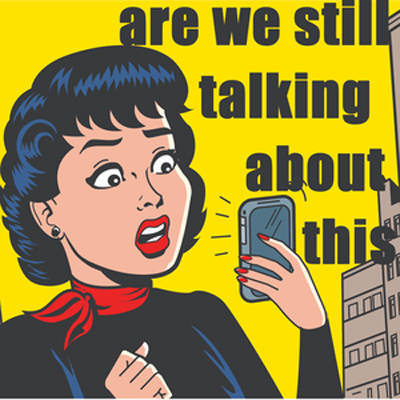Jessica Pilot, writer and stand-up booker for The Late Show With Stephen Colbert, recently launched a podcast called Are We Still Talking About This?, focusing on the cross-section of anxiety and creativity. She’s had a lot of heavy-hitters on the show, including Artie Lange, Gary Gulman, and Laurie Kilmartin. On an episode released today, she and co-host Adam Kaplan talk with writer/director Larry Charles.
“I wanted to do something different and I’d like to think I always am,” says Pilot, a guest on EP67 of The Department of Tangents Podcast. “What Are We Still Talking About strives to be a place for real conversations about anxiety, trauma and creativity. My co-host, Adam Kaplan and I met working on Larry Charles’s Dangerous World of Comedy. The show was anxiety inducing and so, the podcast was born.”
Charles’s work looms large in the comedy world. He has partnered with Sacha Baron Cohen on several films including Borat, and worked on Seinfeld and Curb Your Enthusiasm. His latest work is the four-part Netflix documentary The Dangerous World of Comedy, a must-watch for anyone who thinks they know what edgy comedy is. Political satire in this country can have its consequences, but what about comedians who have to contend with a Liberian warlord who likes to slaughter pregnant women for fun? How about standing in front of that guy and asking him what he finds funny? That’s what you get on Charles’s series, for which Pilot served as a producer.
The theme of the episode is “Survival,” and Charles learned all about that as a kid in Brooklyn living in the Trump Village apartment complex. He shares his story around 33:30 on the podcast. “You talk about bullying today, every other kid where I grew up was a bully,” he says. “You were constantly getting your hat stolen and your books knocked down. You were being chased and you were being slapped arbitrarily because of the color of the jacket that you were wearing, maybe.”
Charles learned how to navigate people’s intentions in dicey situations and how to defend himself, which came in handy in his work later on. “When I did Borat, I found that all those skills were extremely useful,” he says. “We were in danger a lot. I had to talk to police, I had to talk to angry people with guns, I had to talk to people – we were being chased – throwing rocks at us. I had to talk people into things. When I was in Brooklyn, I would have to talk someone into not kicking my ass as much talking them out of not kicking my ass. So the same thing with this, I had to talk people into sitting down with Borat and I was persuasive.”
Listen to the full episode here or find it on the acast site:
